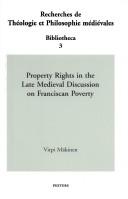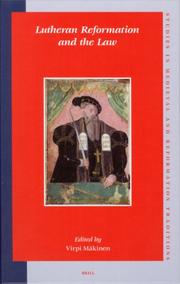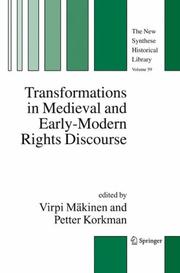| Listing 1 - 10 of 11 | << page >> |
Sort by
|

ISBN: 9042909404 9789042909403 Year: 2001 Volume: 3 Publisher: Leuven Peeters
Abstract | Keywords | Export | Availability | Bookmark
 Loading...
Loading...Choose an application
- Reference Manager
- EndNote
- RefWorks (Direct export to RefWorks)
Poverty --- Religious aspects --- Catholic Church --- History of doctrines --- Franciscans --- History --- 271.3-3 --- Geloften bij de Franciskanen --- 271.3-3 Geloften bij de Franciskanen --- Destitution --- Wealth --- Basic needs --- Begging --- Poor --- Subsistence economy --- Alcantarines --- Bernardyni --- Cordeliers --- Discalced Friars Minor --- Família Franciscana --- Frades Menores --- Frailes Menores --- Franciscains --- Franciscains mineurs --- Franciscan Discalceati --- Franciscan Order --- Franciscan Reformati --- Franciszkanie --- Frant︠s︡iskanskiĭ orden --- Frant︠s︡iskant︠s︡y --- Frati minori --- Fratres minores --- Frères mineurs --- Friars, Gray --- Friars Minor --- Gråbrøderne --- Gray Friars --- Grey Friars --- Mala braća --- Minderbrüder --- Minoriten --- Minorites --- O.F.M. --- Observants --- OFM --- Ojcowie Franciszkanie --- Ordem dos Frades Menores --- Ordem dos Franciscanos --- Ordem Franciscana --- Orden de Frailes Menores --- Orden de los Frailes Menores --- Orden Franciscana --- Orden sv. Frant︠s︡iska --- Order of Friars Minor --- Ordine dei Frati Minori --- Ordine dei minori --- Ordre des frères franciscains mineurs --- Ordo Fratrum Minorum --- Reformati --- Reformed Franciscans --- Seraphic Order --- Capuchins --- Conventuals --- Franciscan Recollects --- History. --- Poverty - Religious aspects - Catholic Church - History of doctrines - Middle Ages, 600-1500

ISBN: 900414904X 9047417445 9789004149045 9789047417446 Year: 2006 Volume: 112 Publisher: Leiden Brill
Abstract | Keywords | Export | Availability | Bookmark
 Loading...
Loading...Choose an application
- Reference Manager
- EndNote
- RefWorks (Direct export to RefWorks)
The volume provides new evidence of how the legal ideas of the Lutheran Reformation were put into practice, especially in the Nordic countries, and how they worked in the history of law. Denmark, Finland, Norway and Sweden forming the largest Lutheran area in the world, this lacuna is considerable. The first part of the book deals with the legal, theological and philosophical thought of the reformers. The second part examines the impact of the Reformation on particular aspects of legal reform, especially marriage and criminal law and the law on poor relief in the Northern Europe. The study is based on interdisciplinary research by theologians and legal historians. Contributors include: Kaarlo Arffman, Pekka Kärkkäinen, Mia Korpiola, Virpi Mäkinen, Heikki Pihlajamäki, Antti Raunio, Risto Saarinen, and Reijo Työrinoja.
Religion and law --- Lutheran Church --- Reformation --- History --- Influence --- Lutheranism --- 284.1 <43> --- Law --- Law and religion --- Protestant Reformation --- Church history --- Counter-Reformation --- Protestantism --- Christian sects --- 284.1 <43> Lutheraanse hervorming. Reformatie van Luther--Duitsland voor 1945 en na 1989 --- Lutheraanse hervorming. Reformatie van Luther--Duitsland voor 1945 en na 1989 --- Religious aspects --- Europe [Northern ] --- 16th century --- Religion and law - Europe, Northern - History - 16th century. --- Lutheran Church - Europe, Northern - Influence - History - 16th century. --- Reformation - Europe, Northern - History - 16th century.
Book
ISBN: 9789519264714 Year: 2010 Publisher: Helsinki Philosophical society of Finland
Abstract | Keywords | Export | Availability | Bookmark
 Loading...
Loading...Choose an application
- Reference Manager
- EndNote
- RefWorks (Direct export to RefWorks)
Law, Medieval --- Natural law --- Philosophy, Medieval --- Philosophy, Modern --- History
Book
ISBN: 9004431535 Year: 2020 Publisher: Leiden ; Boston : Brill,
Abstract | Keywords | Export | Availability | Bookmark
 Loading...
Loading...Choose an application
- Reference Manager
- EndNote
- RefWorks (Direct export to RefWorks)
The essays in this volume explore the ways rights were available to those in the margins of society. By tracing pivotal judicial concepts such as ‘right of necessity’ and ‘subjective rights’ back to their medieval versions, and by situating them in unexpected contexts such as the Franciscans’ theory of poverty and colonization or today’s immigration and border control, this volume invites its readers to consider whether individual rights were in fact, or at least in theory, available to the marginalized. By focusing not only on the economically impoverished but also those who were disenfranchised because of disability, gender, race, religion or infidelity, this book also sheds light on the relationship between the early history of individual rights and social justice at the margins. Contributors are: Wim Decock, Heikki Haara, Virpi Mäkinen, Alejandra Mancilla, Julia McClure, Ilse Paakkinen, Mikko Posti, Jonathan Robinson, John Salter, Pamela Slotte, and Jussi Varkemaa.
Book
ISBN: 1280459034 9786610459032 1402042124 Year: 2006 Volume: 59 Publisher: Dordrecht : Springer,
Abstract | Keywords | Export | Availability | Bookmark
 Loading...
Loading...Choose an application
- Reference Manager
- EndNote
- RefWorks (Direct export to RefWorks)
Rights language is a fundamental feature of the modern world. Virtually all significant social and political struggles are waged, and have been waged for over a century now, in terms of rights claims. In some ways, it is precisely the birth of modern rights language that ushers in modernity in terms of moral and political thought, and the struggle for a modern way of life seems for many synonymous with the fight for a universal recognition of equal, individual human rights. Where did modern rights language come from? What kinds of rights discourses is it rooted in? What is the specific nature of modern rights discourse; when and where were medieval and ancient notions of rights transformed into it? Can one in fact find any single such transformation of medieval into modern rights discourse? The present volume brings together some of the most central scholars in the history of medieval and early-modern rights discourse. Through the different angles taken by its authors, the volume brings to light the multifaceted nature of rights languages in the medieval and early modern world.
Human rights --- Civil rights --- Natural law --- History. --- Political science. --- Political Science. --- Human Rights. --- History, general. --- Theories of Law, Philosophy of Law, Legal History. --- Annals --- Auxiliary sciences of history --- Administration --- Civil government --- Commonwealth, The --- Government --- Political theory --- Political thought --- Politics --- Science, Political --- Social sciences --- State, The --- Human rights. --- Law—Philosophy. --- Law. --- Acts, Legislative --- Enactments, Legislative --- Laws (Statutes) --- Legislative acts --- Legislative enactments --- Jurisprudence --- Legislation --- Basic rights --- Civil rights (International law) --- Rights, Human --- Rights of man --- Human security --- Transitional justice --- Truth commissions --- Law and legislation

ISBN: 9781402042119 1402042116 9048170745 9786610459032 1280459034 1402042124 9781402042126 Year: 2006 Publisher: New York (N.Y.) Springer
Abstract | Keywords | Export | Availability | Bookmark
 Loading...
Loading...Choose an application
- Reference Manager
- EndNote
- RefWorks (Direct export to RefWorks)
Human rights --- History. --- Philosophy --- History
Digital
ISBN: 9781402042126 Year: 2006 Publisher: Dordrecht Springer
Abstract | Keywords | Export | Availability | Bookmark
 Loading...
Loading...Choose an application
- Reference Manager
- EndNote
- RefWorks (Direct export to RefWorks)
Politics --- Roman law --- Legal theory and methods. Philosophy of law --- Canon law --- History --- politieke wetenschappen --- geschiedenis --- recht --- rechtstheorie --- anno 500-1499
Book
ISBN: 3031712021 Year: 2024 Publisher: Cham : Springer International Publishing AG,
Abstract | Keywords | Export | Availability | Bookmark
 Loading...
Loading...Choose an application
- Reference Manager
- EndNote
- RefWorks (Direct export to RefWorks)
Book
ISBN: 9781402042126 Year: 2006 Publisher: Dordrecht Springer
Abstract | Keywords | Export | Availability | Bookmark
 Loading...
Loading...Choose an application
- Reference Manager
- EndNote
- RefWorks (Direct export to RefWorks)
Rights language is a fundamental feature of the modern world. Virtually all significant social and political struggles are waged, and have been waged for over a century now, in terms of rights claims. In some ways, it is precisely the birth of modern rights language that ushers in modernity in terms of moral and political thought, and the struggle for a modern way of life seems for many synonymous with the fight for a universal recognition of equal, individual human rights. Where did modern rights language come from? What kinds of rights discourses is it rooted in? What is the specific nature of modern rights discourse; when and where were medieval and ancient notions of rights transformed into it? Can one in fact find any single such transformation of medieval into modern rights discourse? The present volume brings together some of the most central scholars in the history of medieval and early-modern rights discourse. Through the different angles taken by its authors, the volume brings to light the multifaceted nature of rights languages in the medieval and early modern world.
Politics --- Roman law --- Legal theory and methods. Philosophy of law --- Canon law --- History --- politieke wetenschappen --- geschiedenis --- recht --- rechtstheorie --- anno 500-1499
Book
ISBN: 9789004431539 9789004416772 Year: 2020 Publisher: Leiden ; Boston : Brill,
Abstract | Keywords | Export | Availability | Bookmark
 Loading...
Loading...Choose an application
- Reference Manager
- EndNote
- RefWorks (Direct export to RefWorks)
"The essays in this volume explore the ways rights were available to those on the margins. By tracing pivotal judicial concepts such as 'right of necessity' and 'subjective rights' from their medieval versions, and by situating them in unexpected contexts such as the Franciscans' theory of poverty and colonization or today's immigration and border control, this volume invites its readers to consider whether individual rights were in fact or in theory available to the marginalized. By focusing not only on those who are economically impoverished but also those who were disenfranchised because of disability, gender, race, religion or infidelity, the book also sheds light on the relationship between the early history of individual rights and social justice at the margins"--
Human rights --- Marginality, Social --- Droits de l'homme. --- Exclusion sociale --- Droits de l'homme --- Marginality, Social. --- Public welfare --- Legal assistance to the poor --- Poor laws --- Aide sociale --- Aide à l'accès au droit. --- Lois sur les pauvres. --- Philosophy --- Law and legislation. --- Law. --- History. --- Philosophie --- Droit. --- Histoire --- Philosophy. --- Aide à l'accès au droit.
| Listing 1 - 10 of 11 | << page >> |
Sort by
|

 Search
Search Feedback
Feedback About UniCat
About UniCat  Help
Help News
News